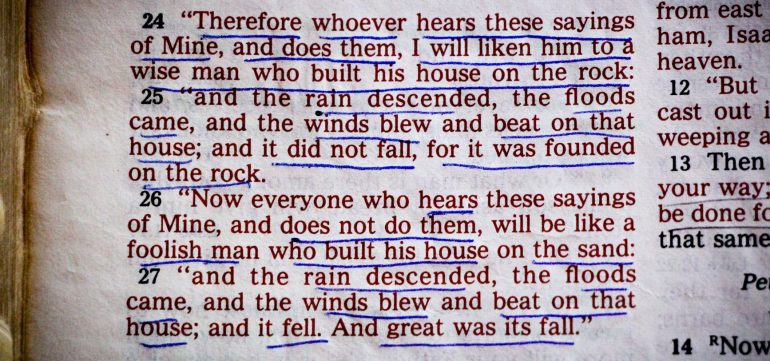E. Stanley Jones was a Methodist missionary and theologian. He is most well known for his work in India and, espeically, his friendship with Gandhi. He has many well known works in missionary, theological, and Methodist circles, including The Christ on the Indian Road, which sold over 1 million copies.
One of his works that has been formative for me is The Christ of the Mount, in which Jones focuses on the teachings of Jesus in the Sermon on the Mount. I really cannot recommend this book enough. It is transformative.
In the introduction Jones addresses how the message and teachings of Jesus has been de-emphasized in much of Christian history, and he addresses this lack of emphasis in our creeds:
Among the many things which India has taught me are two outstanding : First, she compelled me to disentangle Christ from the accretions which the centuries had gathered around him. It was a liberating experience to find one’s faith becoming simplified and centered in a Person. For years I have walked in that liberty; but for several years there has been an undertone of questioning, and rather troubled questioning. The question was this : Yes, Christ is the center, and to be a Christian is to catch his mind and his spirit, but what main content should be in those words “Christ,” “Christian”? It is not enough to have the words. The deeper question concerns the content that is to be in the words. For the content varies, and varies vitally. So India has taught me the second thing : the main moral content in the word “Christian” must be the Sermon on the Mount.
India is forcing us to face anew the Sermon on the Mount. She insists that this is Christianity. No matter how much we may point to our creeds she insists on pointing us to the pattern shown her in the Mount. The fact is that the Sermon on the Mount is not in our creeds. As the Apostles’ Creed now stands you can accept every word of it and leave the essential self untouched. Suppose we had written it in our creeds and had repeated each time with conviction; I believe in the Sermon on the Mount and in its way of life, and I intend, God helping me, to embody it”! What would have happened? I feel sure that if this had been our main emphasis, the history of Christendom would have been different.
With emphasis on doctrines which left unaffected our way of life the Christian Church could accept Constantine as its prize convert. And yet Constantine, after his alleged conversion, murdered his conquered colleague and brother-in-law Licinius ; sentenced to death his eleven-year-old nephew, killed his eldest son, Crispus; brought about the death of his second wife; took the nails that were supposed to come from the cross of Christ and placed one in his war helmet and another on the bridle of his war horse. Yet he was canonized by the Greek Church and his memory celebrated “as equal to the apostles.” He talked and presided at the opening of the Council of Nicea, which was called to frame a creed, and he was hailed as “a bishop of bishops.”
Could this have happened if the men who had gathered there had made the Sermon on the Mount an essential part of the Greed? It had no place in it, so Constantine could be at home. What had happened was that the Christian Church had been conquered by a pagan warrior. And the church allowed itself to be thus conquered, for this ideal of Christ did not have possession of its soul. For the same reason, a bishop could kick another to death in the cathedral of Constantinople to prove his orthodoxy, and the Monophysites of Alexander could cry, “As thou hast divided, so shalt thou be divided,” and then proceed to butcher those who believed in the dual nature of Christ in order to prove that the nature of Christ was one and indivisible.
E. Stanley Jones, The Christ of the Mount,
Introduction, pp. 12-13
(I have added paragraph breaks for readability online)
Later, as if in comparison with Constantine, Jones describes the influence and impact of the teachings of the Sermon on the Mount on Gandhi’s life and work:
A little man In a loin cloth in India picks out from the Sermon on the Mount one of its central principles, applies it as a method for gaining human freedom, and the world, challenged and charmed, bends over to catch the significance of the great sight. It is a portent of what would happen if we would take the whole of the Sermon on the Mount and apply it to the whole of life. It would renew our Christianity it would renew the world. Our present-day Christianity, anaemic and weak from the parasites that have fastened themselves on its life through the centuries, needs a blood-transfusion from the Sermon on the Mount in order to renew radiant health within it that it may throw off these parasites and arise to serve and save the world.
E. Stanley Jones, The Christ of the Mount,
Introduction, p. 13
